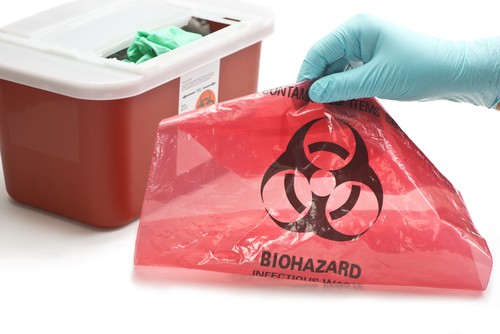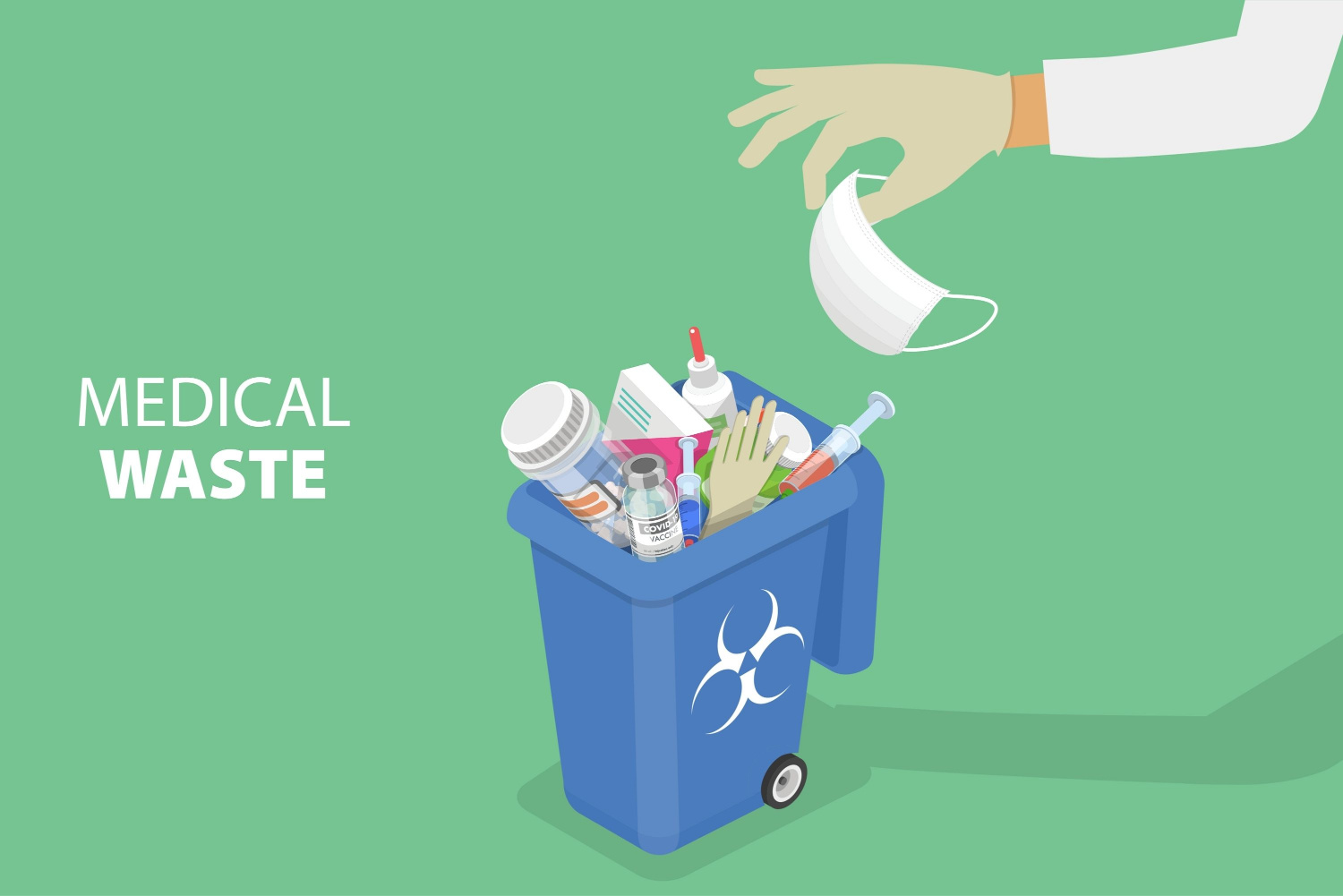Complete Medical Waste Removal Service: Smooth Disposal for Health Care Facilities
Wiki Article
Efficient Techniques of Medical Garbage Disposal
Effective methods of medical waste disposal are vital in keeping public health and environmental security. Clinical waste, consisting of sharps, pathological waste, and pharmaceutical waste, must be dealt with and disposed of properly to stop the spread of infections and secure the setting. This requires adherence to stringent guidelines and the application of specialist waste monitoring techniques.Correct partition of medical waste, protected and risk-free storage, effective treatment and disinfection methods, and environmentally-friendly disposal options are key components of an effective clinical waste disposal system. Professional waste management services play an essential duty in making certain conformity with policies and lessening the threats linked with improper disposal. By utilizing these approaches, healthcare centers can add to a much safer and cleaner environment while safeguarding the well-being of the community.
Correct Partition of Medical Waste
Proper partition of clinical waste is essential for guaranteeing the safe and reliable disposal of these possibly dangerous products. Medical waste describes any type of waste generated throughout health care activities, such as health centers, centers, labs, and study facilities. It consists of a wide variety of products, such as utilized needles, syringes, infected dressings, expired or unused medications, and organic products.By setting apart clinical waste, health care centers can decrease the threat of infections, injuries, and ecological contamination. The process includes classifying waste right into various kinds, such as sharps, infectious waste, pharmaceutical waste, and non-hazardous waste. Each kind requires certain handling, product packaging, and disposal methods to stop exposure to healthcare employees, waste administration workers, and the public.
To guarantee proper partition, medical care facilities need to create clear guidelines and provide sufficient training to team participants. This includes enlightening employees on the various waste categories, appropriate product packaging strategies, and making use of appropriate containers - WasteX Medical Waste Disposal. In addition, clear signs and color-coding systems can be implemented to facilitate the identification and partition of different waste types
Safe and Secure Storage Space of Medical Waste
Safe and safe and secure storage of clinical waste is crucial for maintaining the honesty and containment of possibly harmful materials. Proper storage space not only shields health care workers and the public from direct exposure to hazardous materials however additionally prevents ecological contamination.To guarantee risk-free storage, clinical facilities ought to abide by details guidelines. To start with, waste needs to be stored in leak-proof and puncture-resistant containers that are labeled appropriately. These containers need to be snugly secured to stop any leak or spills. Furthermore, the storage space location should be protected and unattainable to unauthorized workers, reducing the danger of unintended exposure.
Proper partition of clinical waste is additionally vital for safe storage. Various kinds of waste, such as sharps, infectious materials, and pharmaceutical waste, ought to be divided to stop cross-contamination. This segregation can be attained through the use of color-coded bins or containers.
Normal tracking and examination of the storage location are vital to recognize any type of possible risks or violations. This consists of checking for indications of damages or degeneration in the containers, ensuring appropriate air flow, and keeping an eye on temperature and humidity degrees.
Reliable Treatment and Disinfection Techniques

One frequently utilized therapy technique is autoclaving, which includes subjecting the waste to high-pressure heavy steam at temperatures above 121 levels Celsius. This procedure properly eliminates microbes and ruins contagious agents, making the waste secure for further disposal. Another approach is incineration, which entails melting the waste at heats. Incineration not just gets rid of microbes yet likewise decreases the waste volume through burning.
Chemical disinfection is another reliable technique for treating clinical waste. This technique involves utilizing anti-bacterials such as chlorine compounds, phenolic substances, or hydrogen peroxide to kill or suspend microorganisms (WasteX Medical Waste Disposal). Chemical disinfection is commonly utilized for fluid waste, such as lab samples or physical liquids
In recent times, different treatment methods such as microwave sanitation, irradiation, and organic treatment have actually also obtained attention. These techniques provide advantages such as lowered environmental effect and power consumption compared to standard methods.
Environmentally-friendly Disposal Options
In the realm of clinical waste disposal, taking into consideration environmentally-friendly options is vital. Healthcare centers generate a substantial amount of waste, consisting of infectious materials, drugs, and chemicals, which can position severe risks to human health and wellness and the environment if not taken care of correctly. The good news is, there are a number of environmentally-friendly disposal alternatives offered that can aid mitigate these dangers.
Recycling medical waste includes segregating and processing specific products for reuse or repurposing. Furthermore, some health care centers have actually implemented recycling programs for certain medical devices or equipment, further reducing waste generation.
This technique involves converting clinical waste into energy via procedures like incineration or anaerobic digestion. Anaerobic digestion, on the various other hand, get redirected here breaks down organic waste in the lack of oxygen, creating biogas that can be used for power or warmth generation.

Benefits of Professional Waste Monitoring Services
One significant benefit of expert waste monitoring solutions is the improved performance in getting rid of and handling of medical waste. Medical care facilities create a considerable amount of waste that consists of hazardous products, such as sharp things, polluted things, and potentially contagious waste. medical waste disposal. Improper handling and disposal of medical waste position severe health dangers to staff members, patients, and the public. By making use of expert waste monitoring solutions, healthcare facilities can make certain that all medical waste is dealt with and dealt with properly, decreasing the risk of contamination and the spread of illness.Professional waste management solutions use seasoned and experienced employees that are educated concerning the regulations and guidelines for clinical garbage disposal. They have accessibility to specific devices and tools that enable them to take care of various kinds of clinical waste securely and effectively. These services also have reputable procedures and methods in area to guarantee that waste is segregated, packaged, transferred, and disposed of in compliance with neighborhood, state, and government policies.
Moreover, specialist waste administration services can offer healthcare centers with detailed waste administration solutions. They can supply services such as waste collection, transportation, disposal, and therapy, customized to the specific needs and needs of the facility. This removes the concern of managing waste internally, allowing healthcare team to focus on providing high quality patient treatment.
Conclusion
In final thought, efficient approaches of clinical waste disposal entail correct partition, safe storage, therapy and sanitation, and environmentally-friendly disposal options. These methods ensure the safe handling and management of medical waste, avoiding the spread of infections and securing the atmosphere.Clinical waste, including sharps, pathological waste, and pharmaceutical waste, have to be handled and disposed of properly to prevent the spread of infections and protect the environment.Proper partition of clinical waste, risk-free and safe storage, effective treatment and sanitation approaches, and environmentally-friendly disposal choices are essential elements of an efficient medical waste disposal system. The process entails classifying waste into different kinds, such as sharps, transmittable waste, pharmaceutical waste, and non-hazardous waste. By using professional waste management solutions, health care facilities can ensure that all clinical waste is managed and disposed of correctly, reducing the risk of contamination and the spread of illness.
Professional waste management solutions employ experienced and knowledgeable workers who are educated about the laws and standards for medical waste disposal.
Report this wiki page